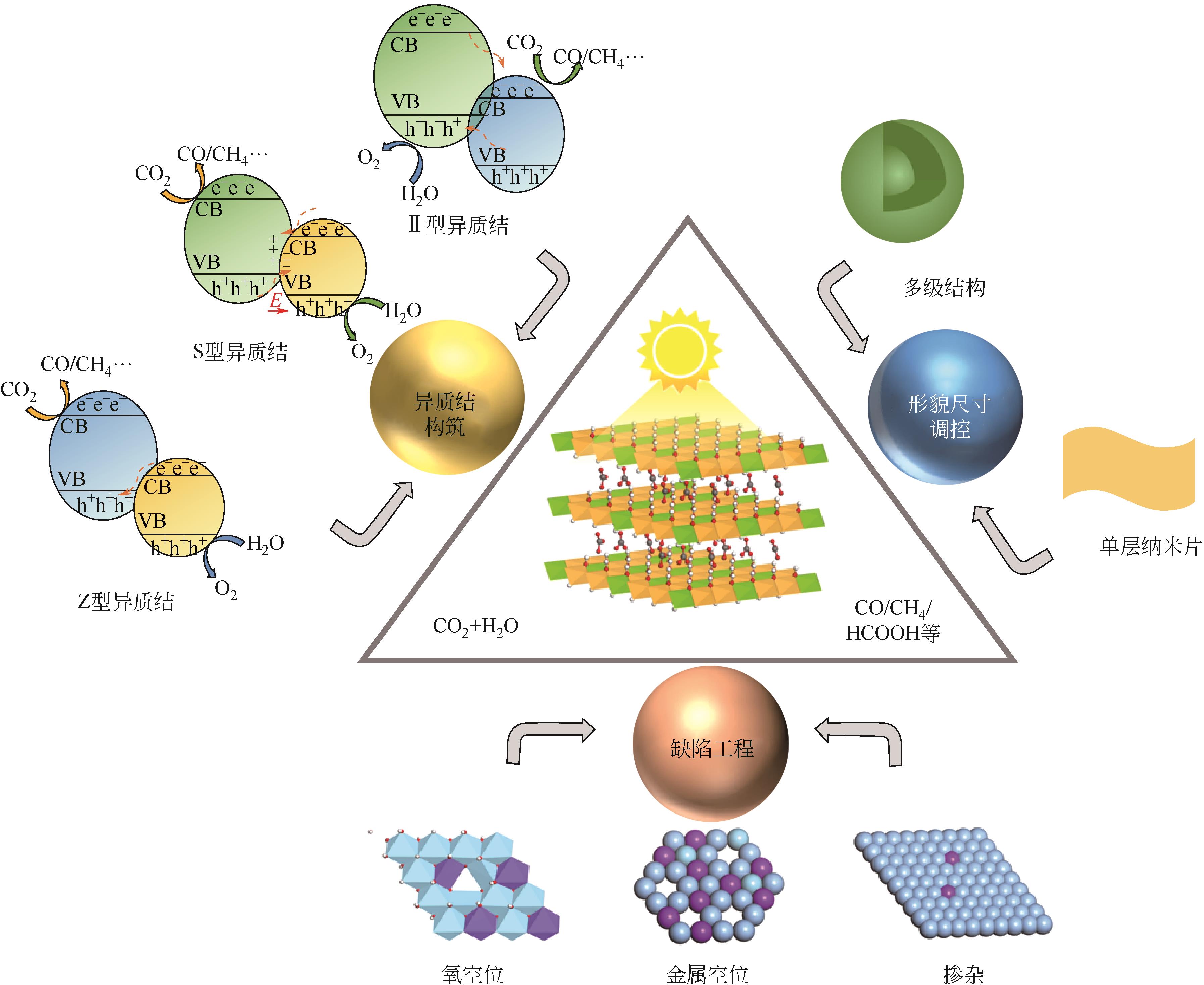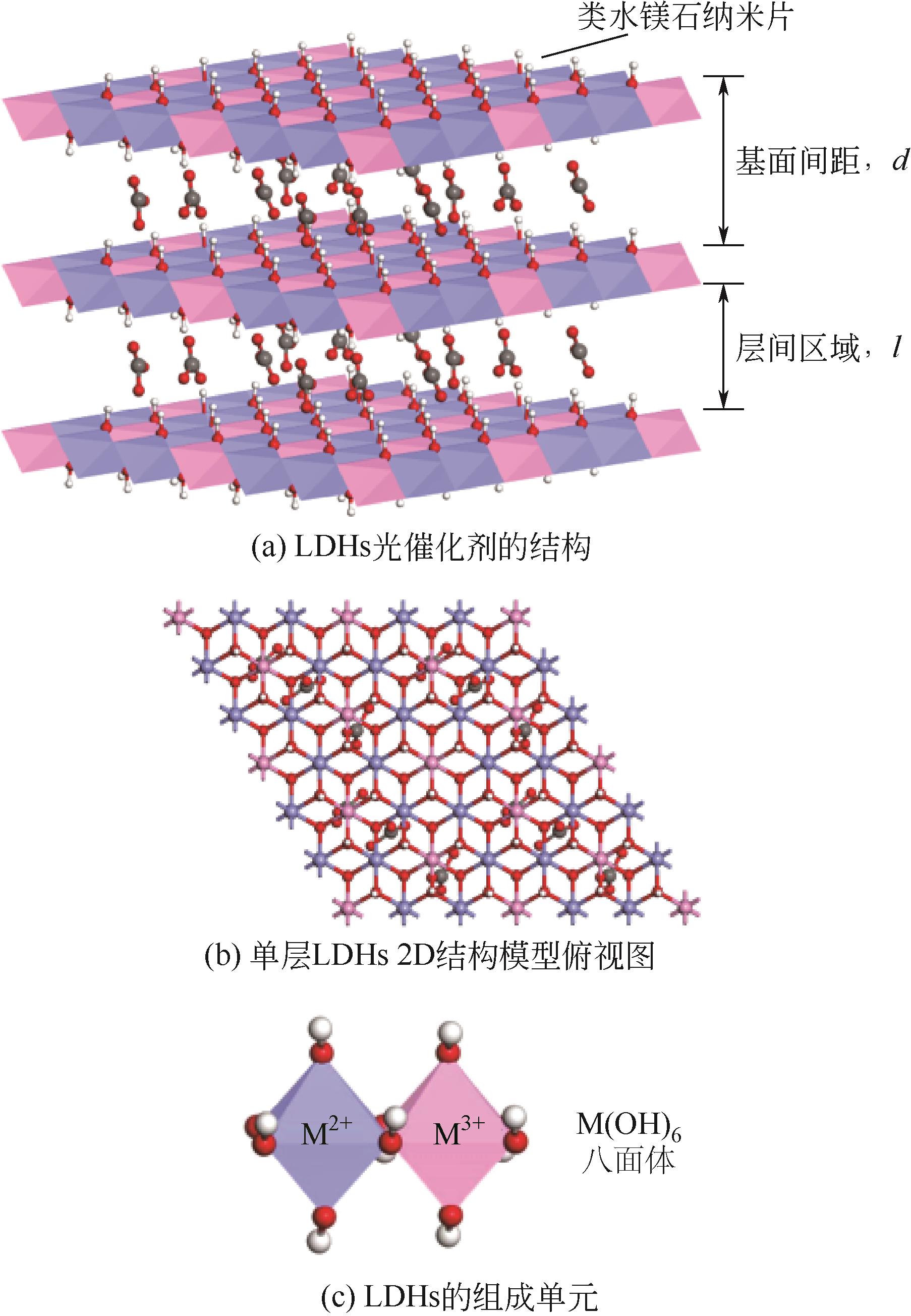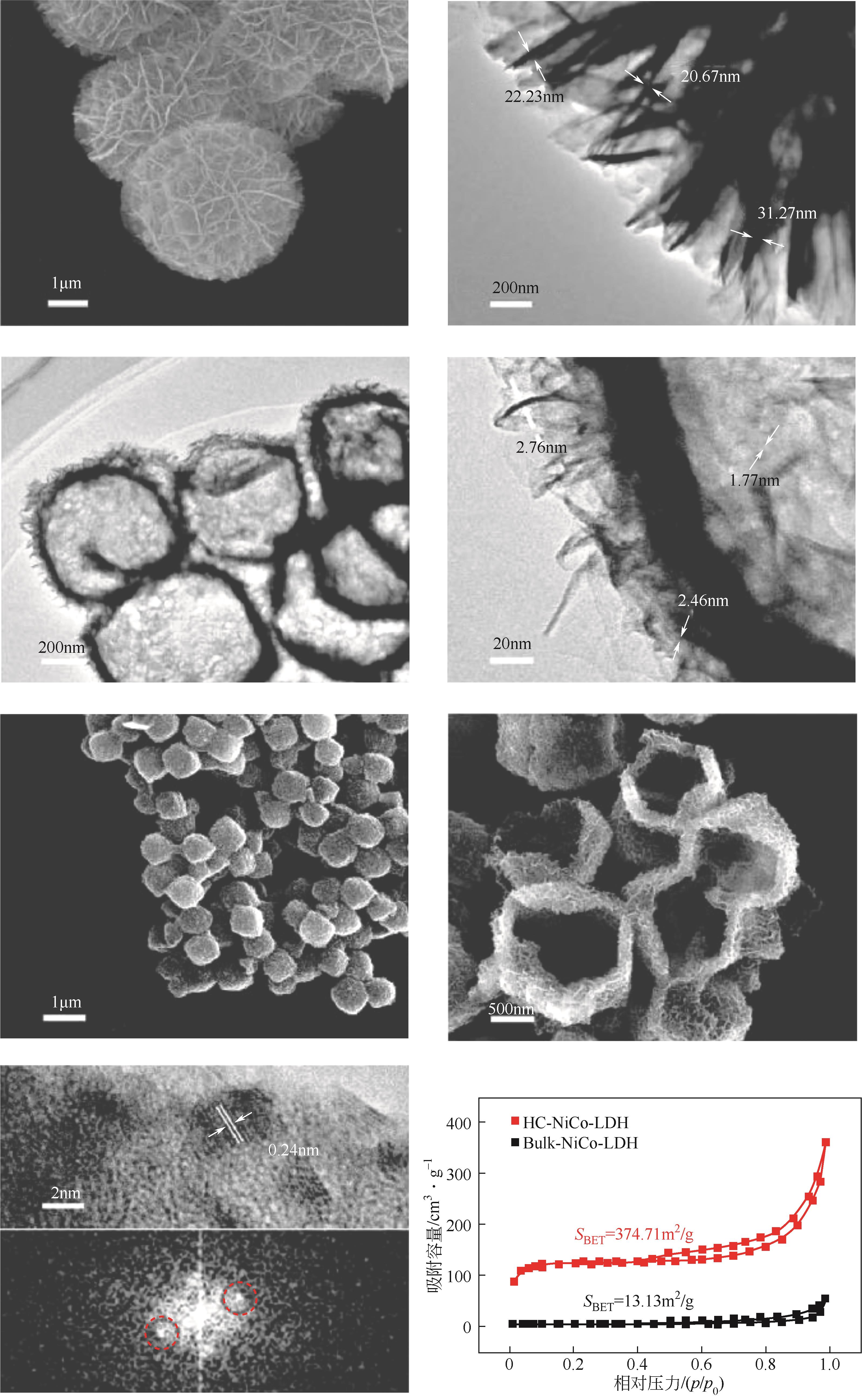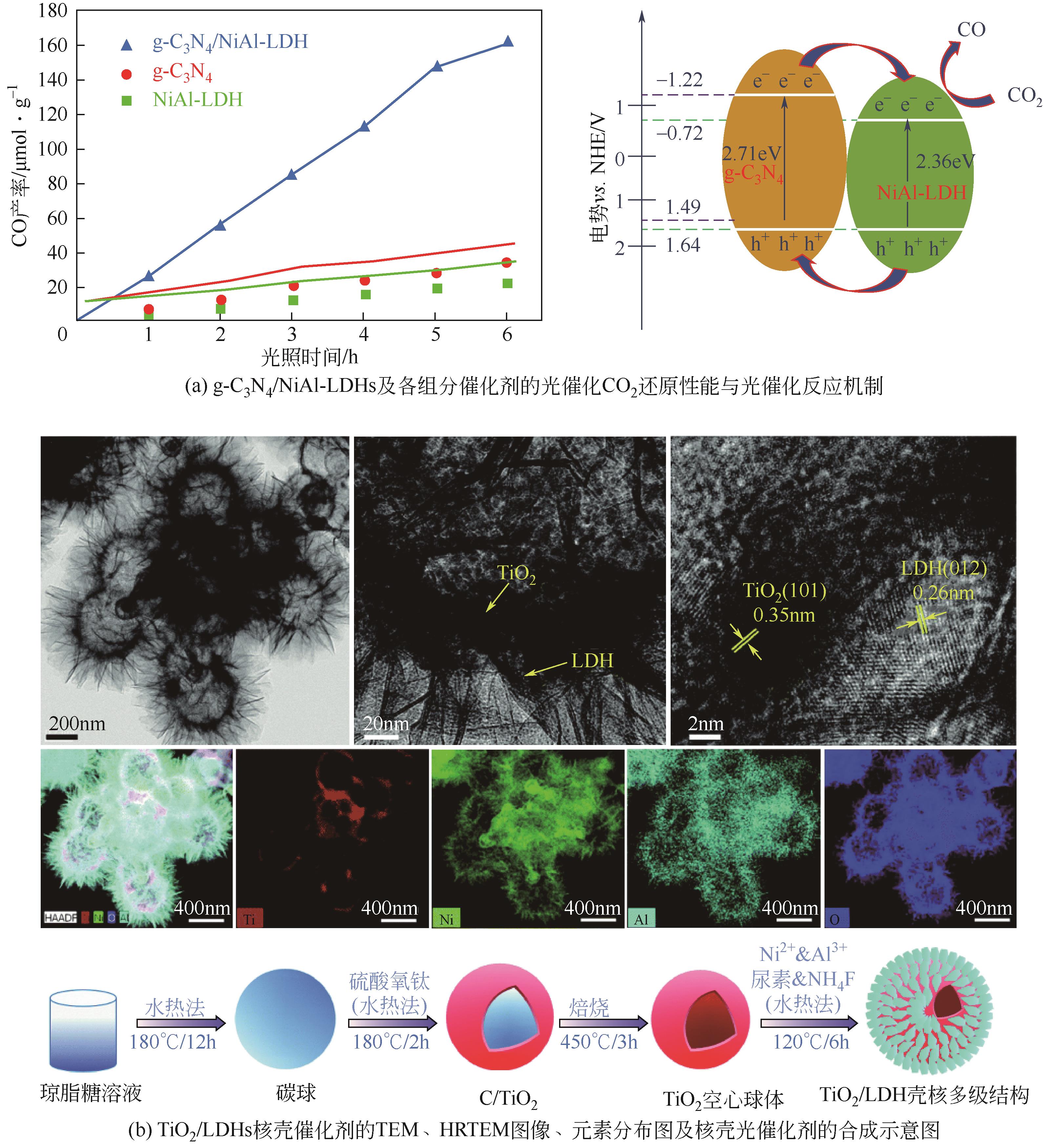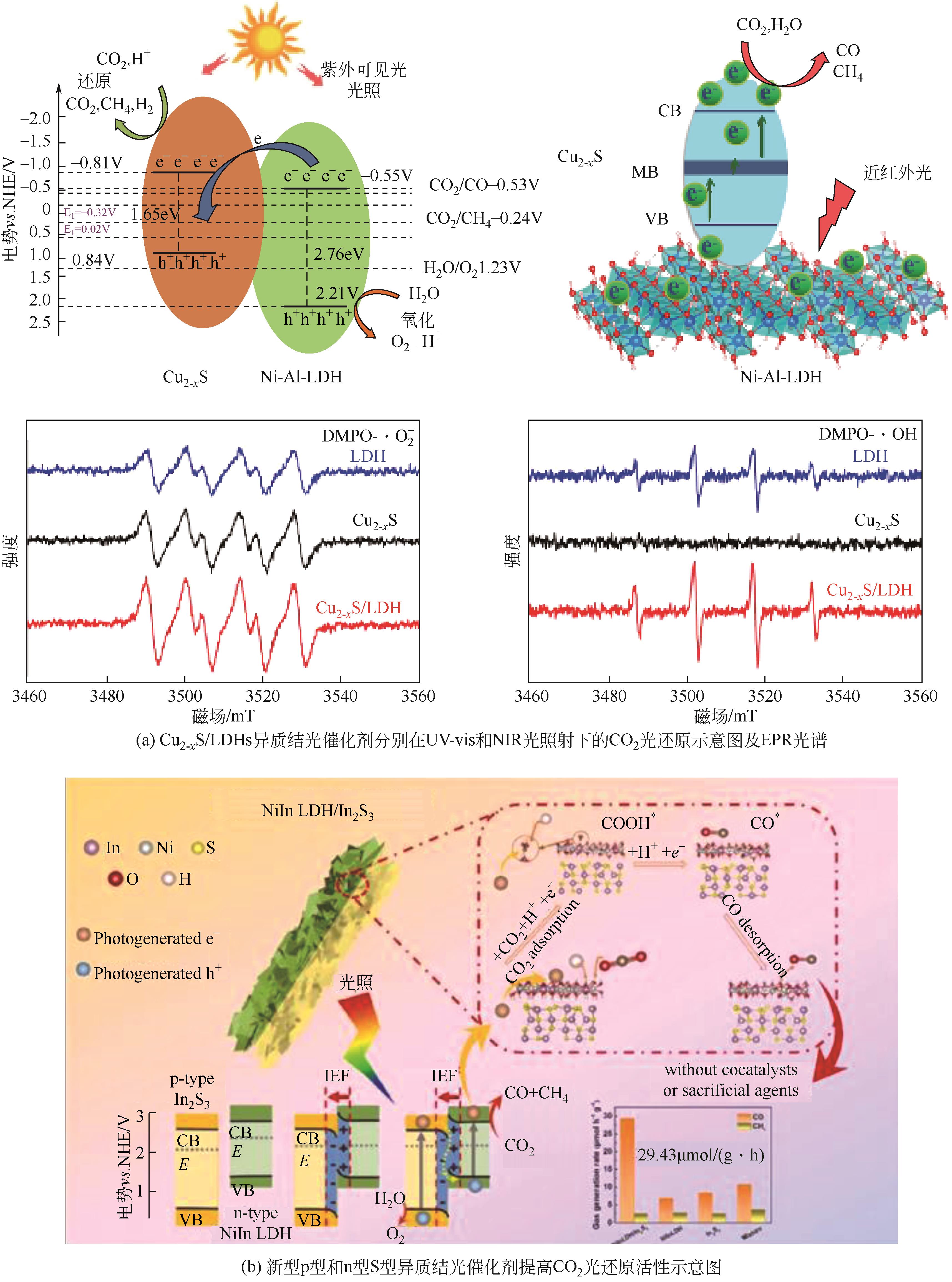Chemical Industry and Engineering Progress ›› 2024, Vol. 43 ›› Issue (7): 3891-3909.DOI: 10.16085/j.issn.1000-6613.2023-0996
• Materials science and technology • Previous Articles Next Articles
Research progress on structural regulation of layered double hydroxides for photocatalytic CO2 reduction
LUO Congjia( ), DOU Yibo(
), DOU Yibo( ), WEI Min
), WEI Min
- State Key Laboratory of Chemical Resource Engineering, College of Chemistry, Beijing University of Chemical Technology, Beijing 100029, China
-
Received:2023-06-16Revised:2023-10-12Online:2024-08-14Published:2024-07-25 -
Contact:DOU Yibo
水滑石光催化剂结构调控用于二氧化碳还原的研究进展
- 北京化工大学化学学院,化工资源有效利用国家重点实验室,北京 100029
-
通讯作者:豆义波 -
作者简介:罗丛佳(1999—),女,硕士研究生,研究方向为光催化二氧化碳还原。E-mail:congjiabjhg0728@163.com。 -
基金资助:国家自然科学基金(22278029);国家重点研发计划(2021YFC2103500);中央高校基本科研业务费专项(butrc202203)
CLC Number:
Cite this article
LUO Congjia, DOU Yibo, WEI Min. Research progress on structural regulation of layered double hydroxides for photocatalytic CO2 reduction[J]. Chemical Industry and Engineering Progress, 2024, 43(7): 3891-3909.
罗丛佳, 豆义波, 卫敏. 水滑石光催化剂结构调控用于二氧化碳还原的研究进展[J]. 化工进展, 2024, 43(7): 3891-3909.
share this article
Add to citation manager EndNote|Ris|BibTeX
URL: https://hgjz.cip.com.cn/EN/10.16085/j.issn.1000-6613.2023-0996
| 还原半反应 | E⊖/V |
|---|---|
| CO2+e- | -1.85 |
| CO2+2H++2e- | -0.61 |
| CO2+2H++2e- | -0.53 |
| CO2+4H++4e- | -0.48 |
| CO2+4H++4e- | -0.20 |
| CO2+6H++6e- | -0.38 |
| CO2+8H++8e- | -0.24 |
| 还原半反应 | E⊖/V |
|---|---|
| CO2+e- | -1.85 |
| CO2+2H++2e- | -0.61 |
| CO2+2H++2e- | -0.53 |
| CO2+4H++4e- | -0.48 |
| CO2+4H++4e- | -0.20 |
| CO2+6H++6e- | -0.38 |
| CO2+8H++8e- | -0.24 |
| 1 | LIU Zhu, DENG Zhu, DAVIS S, et al. Monitoring global carbon emissions in 2022[J]. Nature Reviews Earth & Environment, 2023, 4(4): 205-206. |
| 2 | ARESTA M, DIBENEDETTO A, ANGELINI A. Catalysis for the valorization of exhaust carbon: From CO2 to chemicals, materials, and fuels. Technological use of CO2 [J]. Chemical Reviews, 2014, 114(3): 1709-1742. |
| 3 | WANG Ligang, WANG Dingsheng, LI Yadong. Single-atom catalysis for carbon neutrality[J]. Carbon Energy, 2022, 4(6): 1021-1079. |
| 4 | SHEN Xiaojun, ZHANG Chaofeng, HAN Buxing, et al. Catalytic self-transfer hydrogenolysis of lignin with endogenous hydrogen: Road to the carbon-neutral future[J]. Chemical Society Reviews, 2022, 51(5): 1608-1628. |
| 5 | PRAJAPATI A, SARTAPE R, ROJAS T, et al. Migration-assisted, moisture gradient process for ultrafast, continuous CO2 capture from dilute sources at ambient conditions[J]. Energy & Environmental Science, 2022, 15(2): 680-692. |
| 6 | SONG Tao, ZHAI Zhanmiao, LIU Junchen, et al. Laboratory evaluation of a novel self-healable polymer gel for CO2 leakage remediation during CO2 storage and CO2 flooding[J]. Chemical Engineering Journal, 2022, 444: 136635. |
| 7 | GAO Peng, DANG Shanshan, LI Shenggang, et al. Direct production of lower olefins from CO2 conversion via bifunctional catalysis[J]. ACS Catalysis, 2018, 8(1): 571-578. |
| 8 | 李泽洋, 杨宇森, 卫敏. 二氧化碳还原电催化剂的结构设计及性能研究进展[J]. 化学学报, 2022, 80(2): 199-213. |
| LI Zeyang, YANG Yusen, WEI Min. Structural design and performance of electrocatalysts for carbon dioxide reduction: A review[J]. Acta Chimica Sinica, 2022, 80(2): 199-213. | |
| 9 | GAN Wentian, GUO Xiangjun, HUANG Yun, et al. Temperature-controlled bacteria biofilm adhesion and formation for CO/CO2 bioconversion to ethanol by grafting N-isopropylacrylamide@SiC[J]. Chemical Engineering Journal, 2023, 451: 138602. |
| 10 | HAM R, NIELSEN C J, PULLEN S, et al. Supramolecular coordination cages for artificial photosynthesis and synthetic photocatalysis[J]. Chemical Reviews, 2023, 123(9): 5225-5261. |
| 11 | LI Xin, WEN Jiuqing, Jingxiang LOW, et al. Design and fabrication of semiconductor photocatalyst for photocatalytic reduction of CO2 to solar fuel[J]. Science China Materials, 2014, 57(1): 70-100. |
| 12 | ZHAO Yufei, WATERHOUSE G I N, CHEN Guangbo, et al. Two-dimensional-related catalytic materials for solar-driven conversion of CO x into valuable chemical feedstocks[J]. Chemical Society Reviews, 2019, 48(7): 1972-2010. |
| 13 | WANG Yiou, CHEN Enqi, TANG Junwang. Insight on reaction pathways of photocatalytic CO2 conversion[J]. ACS Catalysis, 2022, 12(12): 7300-7316. |
| 14 | CHANG Xiaoxia, WANG Tuo, GONG Jinlong. CO2 photo-reduction: Insights into CO2 activation and reaction on surfaces of photocatalysts[J]. Energy & Environmental Science, 2016, 9(7): 2177-2196. |
| 15 | LE TRI NGUYEN Dang, KIM Younghye, HWANG Yun Jeong, et al. Progress in development of electrocatalyst for CO2 conversion to selective CO production[J]. Carbon Energy, 2020, 2(1): 72-98. |
| 16 | SUN Zhenyu, TALREJA N, TAO Hengcong, et al. Catalysis of carbon dioxide photoreduction on nanosheets: Fundamentals and challenges[J]. Angewandte Chemie International Edition, 2018, 57(26): 7610-7627. |
| 17 | SCHNEIDER J, MATSUOKA M, TAKEUCHI M, et al. Understanding TiO2 photocatalysis: Mechanisms and materials[J]. Chemical Reviews, 2014, 114(19): 9919-9986. |
| 18 | ZHAO Junjie, LI Yuhang, LIU Pengfei, et al. Local coulomb attraction for enhanced H2 evolution stability of metal sulfide photocatalysts[J]. Applied Catalysis B: Environmental, 2018, 221: 152-157. |
| 19 | MA Xiaohong, LI Danyang, JIANG Yuheng, et al. Fiber-like ZnO with highly dispersed Pt nanoparticles for enhanced photocatalytic CO2 reduction[J]. Journal of Colloid and Interface Science, 2022, 628: 768-776. |
| 20 | HE Lang, ZHANG Wenyuan, LIU Sheng, et al. Three-dimensional porous N-doped graphitic carbon framework with embedded CoO for photocatalytic CO2 reduction[J]. Applied Catalysis B: Environmental, 2021, 298: 120546. |
| 21 | Eun Cheol RA, KIM Kwang Young, KIM Eun Hyup, et al. Recycling carbon dioxide through catalytic hydrogenation: Recent key developments and perspectives[J]. ACS Catalysis, 2020, 10(19): 11318-11345. |
| 22 | MENG Aiyun, ZHANG Liuyang, CHENG Bei, et al. Dual cocatalysts in TiO2 photocatalysis[J]. Advanced Materials, 2019, 31(30): 1807660. |
| 23 | VIKRANT K, WEON Seunghyun, KIM Ki-Hyun, et al. Platinized titanium dioxide (Pt/TiO2) as a multi-functional catalyst for thermocatalysis, photocatalysis, and photothermal catalysis for removing air pollutants[J]. Applied Materials Today, 2021, 23: 100993. |
| 24 | CHEN Shilong, ABDEL-MAGEED A M, MOCHIZUKI C, et al. Controlling the O-vacancy formation and performance of Au/ZnO catalysts in CO2 reduction to methanol by the ZnO particle size[J]. ACS Catalysis, 2021, 11(15): 9022-9033. |
| 25 | DONG Wenwen, JIA Jing, WANG Ye, et al. Visible-light-driven solvent-free photocatalytic CO2 reduction to CO by Co-MOF/Cu2O heterojunction with superior selectivity[J]. Chemical Engineering Journal, 2022, 438: 135622. |
| 26 | ZHAO Yufei, LI Bei, WANG Qiang, et al. NiTi-Layered double hydroxides nanosheets as efficient photocatalysts for oxygen evolution from water using visible light[J]. Chemical Science, 2014, 5(3): 951-958. |
| 27 | ZHAO Yufei, ZHAO Yunxuan, WATERHOUSE G I N, et al. Photocatalysts: Layered-double-hydroxide nanosheets as efficient visible-light-driven photocatalysts for dinitrogen fixation[J]. Advanced Materials, 2017, 29(42): 1703828. |
| 28 | ZHANG Guanhua, ZHANG Xueqiang, MENG Yue, et al. Layered double hydroxides-based photocatalysts and visible-light driven photodegradation of organic pollutants: A review[J]. Chemical Engineering Journal, 2020, 392: 123684. |
| 29 | 寇佳伟, 程淑艳, 程芳琴. 类水滑石基催化剂光催化二氧化碳还原研究进展[J]. 化工进展, 2022, 41(S1): 190-198. |
| KOU Jiawei, CHENG Shuyan, CHENG Fangqin. Research advance of hydrotalcite-based catalysts in photocatalytic reduction of carbon dioxide[J]. Chemical Industry and Engineering Progress, 2022, 41(S1): 190-198. | |
| 30 | XU Ming, WEI Min. Layered double hydroxide-based catalysts: Recent advances in preparation, structure, and applications[J]. Advanced Functional Materials, 2018, 28(47): 1802943. |
| 31 | ZHANG Shiming, RONG Yiyuan, WEI Jingwen, et al. Flower-like microspheres Z-scheme Bi2Sn2O7/NiAl-LDH heterojunction for boosting photocatalytic CO2 reduction under visible light[J]. Journal of Colloid and Interface Science, 2023, 629: 604-615. |
| 32 | WANG Kefu, ZHANG Ling, SU Yang, et al. Photoreduction of carbon dioxide of atmospheric concentration to methane with water over CoAl-layered double hydroxide nanosheets[J]. Journal of Materials Chemistry A, 2018, 6(18): 8366-8373. |
| 33 | IGUCHI S, TERAMURA K, HOSOKAWA S, et al. Photocatalytic conversion of CO2 in water using fluorinated layered double hydroxides as photocatalysts[J]. Applied Catalysis A: General, 2016, 521: 160-167. |
| 34 | QIU Bocheng, DU Mengmeng, MA Yingxin, et al. Integration of redox cocatalysts for artificial photosynthesis[J]. Energy & Environmental Science, 2021, 14(10): 5260-5288. |
| 35 | LI Xin, YU Jiaguo, JARONIEC M, et al. Cocatalysts for selective photoreduction of CO2 into solar fuels[J]. Chemical Reviews, 2019, 119(6): 3962-4179. |
| 36 | LEI Qinqin, YUAN Huiqing, DU Jiehao, et al. Photocatalytic CO2 reduction with aminoanthraquinone organic dyes[J]. Nature Communications, 2023, 14: 1087. |
| 37 | WANG Yanjie, HE Tao. Recent advances in and comprehensive consideration of the oxidation half reaction in photocatalytic CO2 conversion[J]. Journal of Materials Chemistry A, 2021, 9(1): 87-110. |
| 38 | KONG Tingting, JIANG Yawen, XIONG Yujie. Photocatalytic CO2 conversion: What can we learn from conventional CO x hydrogenation?[J]. Chemical Society Reviews, 2020, 49(18): 6579-6591. |
| 39 | IKREEDEEGH R R, TAHIR M. A critical review in recent developments of metal-organic-frameworks (MOFs) with band engineering alteration for photocatalytic CO2 reduction to solar fuels[J]. Journal of CO2 Utilization, 2021, 43: 101381. |
| 40 | 陈钱, 匡勤, 谢兆雄. 二维材料在光催化二氧化碳还原中的研究进展[J]. 化学学报, 2021, 79(1): 10-22. |
| CHEN Qian, KUANG Qin, XIE Zhaoxiong. Research progress of photocatalytic CO2 reduction based on two-dimensional materials[J]. Acta Chimica Sinica, 2021, 79(1): 10-22. | |
| 41 | KIM K, KIM S, MOON B, et al. Quadruple metal-based layered structure as the photocatalyst for conversion of carbon dioxide into a value added carbon monoxide with high selectivity and efficiency[J]. Journal of Materials Chemistry A, 2017, 18(5):8274-8279. |
| 42 | XIONG Xuyang, ZHAO Yufei, SHI Run, et al. Selective photocatalytic CO2 reduction over Zn-based layered double hydroxides containing tri or tetravalent metals[J]. Science Bulletin, 2020, 65(12): 987-994. |
| 43 | SU Senda, LI Xiaoman, TAN Mengyao, et al. Enhancement of the properties of ZnAl-LDHs for photocatalytic nitrogen reduction reaction by controlling anion intercalation[J]. Inorganic Chemistry Frontiers, 2023, 10(3): 869-879. |
| 44 | XU Simin, PAN Ting, DOU Yibo, et al. Theoretical and experimental study on MⅡMⅢ-layered double hydroxides as efficient photocatalysts toward oxygen evolution from water[J]. The Journal of Physical Chemistry C, 2015, 119(33): 18823-18834. |
| 45 | ZHAO Yufei, JIA Xiaodan, WATERHOUSE G I N, et al. Layered double hydroxide nanostructured photocatalysts for renewable energy production[J]. Advanced Energy Materials, 2016, 6(6): 1501974. |
| 46 | JIAO Xingchen, ZHENG Kai, LIANG Liang, et al. Fundamentals and challenges of ultrathin 2D photocatalysts in boosting CO2 photoreduction[J]. Chemical Society Reviews, 2020, 49(18): 6592-6604. |
| 47 | CHEN Weiyi, HAN Bin, XIE Yili, et al. Ultrathin Co-Co LDHs nanosheets assembled vertically on MXene: 3D nanoarrays for boosted visible-light-driven CO2 reduction[J]. Chemical Engineering Journal, 2020, 391: 123519. |
| 48 | GUO Qiangsheng, ZHANG Qinghong, WANG Hongzhi, et al. Core-shell structured ZnO@Cu-Zn-Al layered double hydroxides with enhanced photocatalytic efficiency for CO2 reduction[J]. Catalysis Communications, 2016, 77: 118-122. |
| 49 | KHAN A ALI, TAHIR M. Construction of an S-scheme heterojunction with oxygen-vacancy-rich trimetallic CoAlLa-LDH anchored on titania-sandwiched Ti3C2 multilayers for boosting photocatalytic CO2 reduction under visible light[J]. Industrial & Engineering Chemistry Research, 2021, 60(45): 16201-16223. |
| 50 | WANG Yifei, HAN Peng, LV Ximeng, et al. Defect and interface engineering for aqueous electrocatalytic CO2 reduction[J]. Joule, 2018, 2(12): 2551-2582. |
| 51 | ZHU Jiayi, LI Ting, WANG Shaohong, et al. Lattice-distortion active sites of Ni-doped CuMgFe LDH for benzotraizole degradation[J]. Journal of Environmental Chemical Engineering, 2022, 10(3): 107903. |
| 52 | TAVARES S R, NANGOI I M, LEITÃO A A. Computational investigation of two-dimensional LDHs and the modification of their electronic structure induced by defects[J]. Applied Surface Science, 2020, 532: 147159. |
| 53 | BAI Sha, NING Chenjun, WANG Huijuan, et al. VO4-modified layered double hydroxides nanosheets for highly selective photocatalytic CO2 reduction to C1 products[J]. Small, 2022, 18(40): e2203787. |
| 54 | KHAN A ALI, TAHIR M. Synergistic effect of Co/La in oxygen vacancy rich ternary CoAlLa layered double hydroxide with enhanced reductive sites for selective photoreduction of CO2 to CH4 [J]. Energy & Fuels, 2021, 35(10): 8922-8943. |
| 55 | ZHAO Yufei, CHEN Guangbo, BIAN Tong, et al. Photoreduction: Defect-rich ultrathin ZnAl-layered double hydroxide nanosheets for efficient photoreduction of CO2 to CO with water[J]. Advanced Materials, 2015, 27(47): 7823. |
| 56 | GUO Jiaqing, SHEN Haochen, WU Guang, et al. Synergy of various defects in CoAl-layered double hydroxides photocatalyzed CO2 reduction: A first-principles study[J]. Catalysis Letters, 2023, 153(4): 933-944. |
| 57 | PENG Lishan, YANG Na, YANG Yuqi, et al. Atomic cation-vacancy engineering of NiFe-layered double hydroxides for improved activity and stability towards the oxygen evolution reaction[J]. Angewandte Chemie International Edition, 2021, 60(46): 24612-24619. |
| 58 | XU Jie, LIU Xiaowei, ZHOU Zijian, et al. Surface defects introduced by metal doping into layered double hydroxide for CO2 photoreduction: The effect of metal species in light absorption, charge transfer and CO2 reduction[J]. Chemical Engineering Journal, 2022, 442: 136148. |
| 59 | XU Dongcun, FU Gang, LI Zhongming, et al. Functional regulation of ZnAl-LDHs and mechanism of photocatalytic reduction of CO2: A DFT study[J]. Molecules, 2023, 28(2): 738. |
| 60 | TAN Ling, XU Simin, WANG Zelin, et al. Highly selective photoreduction of CO2 with suppressing H2 evolution over monolayer layered double hydroxide under irradiation above 600 nm[J]. Angewandte Chemie International Edition, 2019, 58(34): 11860-11867. |
| 61 | TAN Ling, XU Simin, WANG Zelin, et al. 600nm induced nearly 99% selectivity of CH4 from CO2 photoreduction using defect-rich monolayer structures[J]. Cell Reports Physical Science, 2021, 2(2): 100322. |
| 62 | YANG Junshan, LI Chao, LIANG Derui, et al. Central-collapsed structure of CoFeAl layered double hydroxides and its photocatalytic performance[J]. Journal of Colloid and Interface Science, 2021, 590: 571-579. |
| 63 | ZHANG Lei, XIE Zhaoxiong, GONG Jinlong. Shape-controlled synthesis of Au-Pd bimetallic nanocrystals for catalytic applications[J]. Chemical Society Reviews, 2016, 45(14): 3916-3934. |
| 64 | 杨冬, 周致远, 丁菲, 等. 特殊形貌g-C3N4基光催化材料的研究进展[J]. 化工进展, 2019, 38(1): 495-504. |
| YANG Dong, ZHOU Zhiyuan, DING Fei, et al. Research advances of g-C3N4-based photocatalytic materials with special morphologies[J]. Chemical Industry and Engineering Progress, 2019, 38(1): 495-504. | |
| 65 | WANG Dingsheng, LI Yadong. Bimetallic nanocrystals: Liquid-phase synthesis and catalytic applications[J]. Advanced Materials, 2011, 23(9): 1044-1060. |
| 66 | WANG Ruonan, WANG Zhen, WAN Shipeng, et al. Facile layer regulation strategy of layered double hydroxide nanosheets for artificial photosynthesis and mechanism insight[J]. Chemical Engineering Journal, 2022, 434: 134434. |
| 67 | BAI Sha, LI Tian, WANG Huijuan, et al. Scale-up synthesis of monolayer layered double hydroxide nanosheets via separate nucleation and aging steps method for efficient CO2 photoreduction[J]. Chemical Engineering Journal, 2021, 419: 129390. |
| 68 | ZHANG Lianyang, MENG Yue, PAN Guoxiang, et al. Experimental and theoretical investigations into the performance and mechanism of CO2 capture by 3D and 2D ZnAl layered double hydroxides[J]. Inorganic Chemistry, 2020, 59(23): 17722-17731. |
| 69 | WANG Qiang, O'HARE D. Large-scale synthesis of highly dispersed layered double hydroxide powders containing delaminated single layer nanosheets[J]. Chemical Communications, 2013, 49(56): 6301-6303. |
| 70 | AN Jiamin, SHEN Tianyang, CHANG Wen, et al. Defect engineering of NiCo-layered double hydroxide hollow nanocages for highly selective photoreduction of CO2 to CH4 with suppressing H2 evolution[J]. Inorganic Chemistry Frontiers, 2021, 8(4): 996-1004. |
| 71 | SHI Qunrong, HUANG Junjie, YANG Yong, et al. In-situ construction of urchin-like hierarchical g-C3N4/NiAl-LDH hybrid for efficient photoreduction of CO2 [J]. Materials Letters, 2020, 268: 127560. |
| 72 | Wankuen JO, MORU S, TONDA S. A green approach to the fabrication of a TiO2/NiAl-LDH core-shell hybrid photocatalyst for efficient and selective solar-powered reduction of CO2 into value-added fuels[J]. Journal of Materials Chemistry A, 2020, 8(16): 8020-8032. |
| 73 | FAZAL H, IQBAL A, CAO Yucai, et al. Porous urchin-like 3D Co(Ⅱ)Co(Ⅲ) layered double hydroxides for high performance heterogeneous Fenton degradation[J]. CrystEngComm, 2021, 23(5): 1234-1242. |
| 74 | HONG Jindui, ZHANG Wei, WANG Yabo, et al. Photocatalytic reduction of carbon dioxide over self-assembled carbon nitride and layered double hydroxide: The role of carbon dioxide enrichment[J]. ChemCatChem, 2014, 6(8): 2315-2321. |
| 75 | WANG Mengmeng, CHEN Dongyun, LI Najun, et al. Ni-Co bimetallic hydroxide nanosheet arrays anchored on graphene for adsorption-induced enhanced photocatalytic CO2 reduction[J]. Advanced Materials, 2022, 34(28): e2202960. |
| 76 | TONDA S, KUMAR S, BHARDWAJ M, et al. g-C3N4/NiAl-LDH 2D/2D hybrid heterojunction for high-performance photocatalytic reduction of CO2 into renewable fuels[J]. ACS Applied Materials & Interfaces, 2018, 10(3): 2667-2678. |
| 77 | ZHANG Liuyang, ZHANG Jianjun, YU Huogen, et al. Emerging S-scheme photocatalyst[J]. Advanced Materials, 2022, 34(11): e2107668. |
| 78 | LIU Jun, MA Nanke, WU Wei, et al. Recent progress on photocatalytic heterostructures with full solar spectral responses[J]. Chemical Engineering Journal, 2020, 393: 124719. |
| 79 | KUMAR S, ISAACS M A, TROFIMOVAITE R, et al. P25@CoAl layered double hydroxide heterojunction nanocomposites for CO2 photocatalytic reduction[J]. Applied Catalysis B: Environmental, 2017, 209: 394-404. |
| 80 | YANG Min, WANG Peng, LI Youji, et al. Graphene aerogel-based NiAl-LDH/g-C3N4 with ultratight sheet-sheet heterojunction for excellent visible-light photocatalytic activity of CO2 reduction[J]. Applied Catalysis B: Environmental, 2022, 306: 121065. |
| 81 | MIAO Yufang, GUO Ruitang, GU Jingwen, et al. Fabrication of β-In2S3/NiAl-LDH heterojunction photocatalyst with enhanced separation of charge carriers for efficient CO2 photocatalytic reduction[J]. Applied Surface Science, 2020, 527: 146792. |
| 82 | JI Xiangyin, GUO Ruitang, TANG Junying, et al. Construction of full solar-spectrum-driven Cu2– x S/Ni-Al-LDH heterostructures for efficient photocatalytic CO2 reduction[J]. ACS Applied Energy Materials, 2022, 5(3): 2862-2872. |
| 83 | HAN Xinxin, LU Bingjie, HUANG Xin, et al. Novel p- and n-type S-scheme heterojunction photocatalyst for boosted CO2 photoreduction activity[J]. Applied Catalysis B: Environmental, 2022, 316: 121587. |
| 84 | YANG Yong, WU Jiajia, XIAO Tingting, et al. Urchin-like hierarchical CoZnAl-LDH/RGO/g-C3N4 hybrid as a Z-scheme photocatalyst for efficient and selective CO2 reduction[J]. Applied Catalysis B: Environmental, 2019, 255: 117771. |
| 85 | ZHU Biao, XU Qianxin, BAO Xiaoyan, et al. g-C3N4/CoNiFe-LDH Z-scheme heterojunction for efficient CO2 photoreduction and MB dye photodegradation[J]. Catalysis Science & Technology, 2021, 11(23): 7727-7739. |
| 86 | WU Yujie, GONG Yinyan, LIU Jiahao, et al. Constructing NiFe-LDH wrapped Cu2O nanocube heterostructure photocatalysts for enhanced photocatalytic dye degradation and CO2 reduction via Z-scheme mechanism[J]. Journal of Alloys and Compounds, 2020, 831: 154723. |
| [1] | ZHAO Yulong, CAI Kai, YU Shanqing. Influence of pore structure of alumina on the adsorption, diffusion and reactivity of hydrocarbon molecules in catalytic cracking [J]. Chemical Industry and Engineering Progress, 2025, 44(S1): 213-221. |
| [2] | LI Junliang, LI Yue, SUN Daolai. Hydrodeoxygenation of 1,2-butanediol to 1-butanol over Cu/SiO2-Al2O3 catalyst [J]. Chemical Industry and Engineering Progress, 2025, 44(S1): 222-231. |
| [3] | LIU Chao, DING Chengao, WU Baoshun, LEI Xinyu, WANG Guangying, YU Zhengwei. Effect of TiO2 support particle size on the denitrification and water/sulfur poisoning resistance of RuO x -V2O5-WO3/TiO2 catalyst [J]. Chemical Industry and Engineering Progress, 2025, 44(S1): 232-242. |
| [4] | ZHANG Hanlin, YUE Xuehai, LIU Junxi, YIN Fengjun. Fabrication of high stability electrocatalyst for oxygen evolution reaction by Ru-Sr-Ir electrodeposition [J]. Chemical Industry and Engineering Progress, 2025, 44(S1): 243-251. |
| [5] | ZHANG Hongwu, HU Qihui, ZHAO Xuefeng, LI Yuxing, MENG Lan, ZHANG Lijun, ZHU Jianlu, WANG Wuchang. Research progress on leakage risk of onshore CO2 pipeline [J]. Chemical Industry and Engineering Progress, 2025, 44(S1): 462-477. |
| [6] | LIU Zhe, ZHOU Shunli, LI Yongxiang, ZHANG Chengxi, LIU Yipeng. Research progress on alkyl naphthalene synthesis catalysts [J]. Chemical Industry and Engineering Progress, 2025, 44(S1): 144-158. |
| [7] | LIN Yijie, QIAO Peng, LI Xinrui, ZHANG Hongbin, WANG Xueqin. Construction and application of heterostructures of photocatalyst TiO2 nanomaterials [J]. Chemical Industry and Engineering Progress, 2025, 44(S1): 159-177. |
| [8] | WANG Tao, ZHANG Xuebing, ZHANG Qi, CHEN Qiang, ZHANG Kui, MEN Zhuowu. Effects of reduction-carburization temperature and inlet CO concentration on industrial precipitated iron-based catalyst for Fischer-Tropsch synthesis [J]. Chemical Industry and Engineering Progress, 2025, 44(S1): 178-184. |
| [9] | BAO Xinde, LIU Biye, HUANG Renwei, HONG Yuhao, GUAN Xin, LIN Jinguo. Preparation of biomass-based@CuNiOS composite catalysts for the reduction of organic dye [J]. Chemical Industry and Engineering Progress, 2025, 44(S1): 185-196. |
| [10] | ZHAO Siyang, LI Chenran, LIU Yang. Process optimization for regulating diene selectivity of MTO regenerated catalyst through pre-carbon deposition using C4 by-product [J]. Chemical Industry and Engineering Progress, 2025, 44(S1): 205-212. |
| [11] | LIU Kefeng, DONG Weigang, HU Xuesheng, LIU Taoran, ZHOU Huaqun, SHI Wen, WAN Zi’an, GAO Fei. Policies and measures to promote the development of CCUS [J]. Chemical Industry and Engineering Progress, 2025, 44(9): 4879-4897. |
| [12] | XUE Zijie, WU Yan, CUI Ziyuan, XU Guanxin, TANG Shuo, WANG Yufei, MA Mingyan. Long cycle green ammonia synthesis model based on economic analysis: Considering the impact of continuous changes in grid carbon emission factors [J]. Chemical Industry and Engineering Progress, 2025, 44(9): 4917-4927. |
| [13] | CHEN Zizhao, HE Fangshu, HU Qiang, YANG Yang, CHEN Hanping, YANG Haiping. Research progress on anti-carbon deposition Ni-based catalysts for dry reforming of methane [J]. Chemical Industry and Engineering Progress, 2025, 44(9): 4968-4978. |
| [14] | WANG Zhen, ZHANG Yaoyuan, WU Qin, SHI Daxin, CHEN Kangcheng, LI Hansheng. Development of Ni/Al2O3-based catalysts for the dry reforming of methane [J]. Chemical Industry and Engineering Progress, 2025, 44(9): 4979-4998. |
| [15] | ZHANG Haipeng, QIN Shanshan, WANG Yuxuan, YU Haibiao. Preparation of 3.0F-Ag x Co catalysts for N2O decomposition [J]. Chemical Industry and Engineering Progress, 2025, 44(9): 4999-5005. |
| Viewed | ||||||
|
Full text |
|
|||||
|
Abstract |
|
|||||
